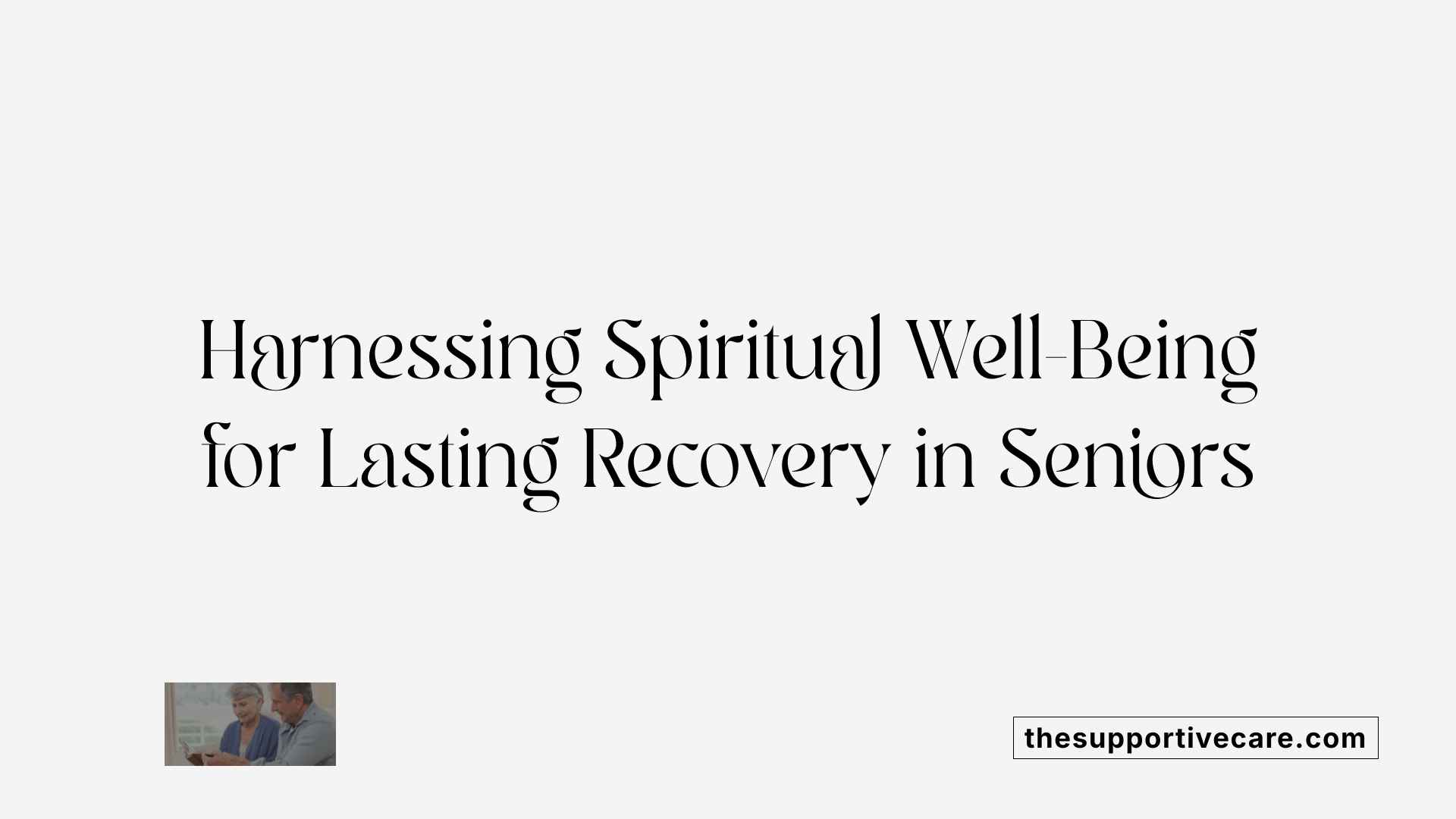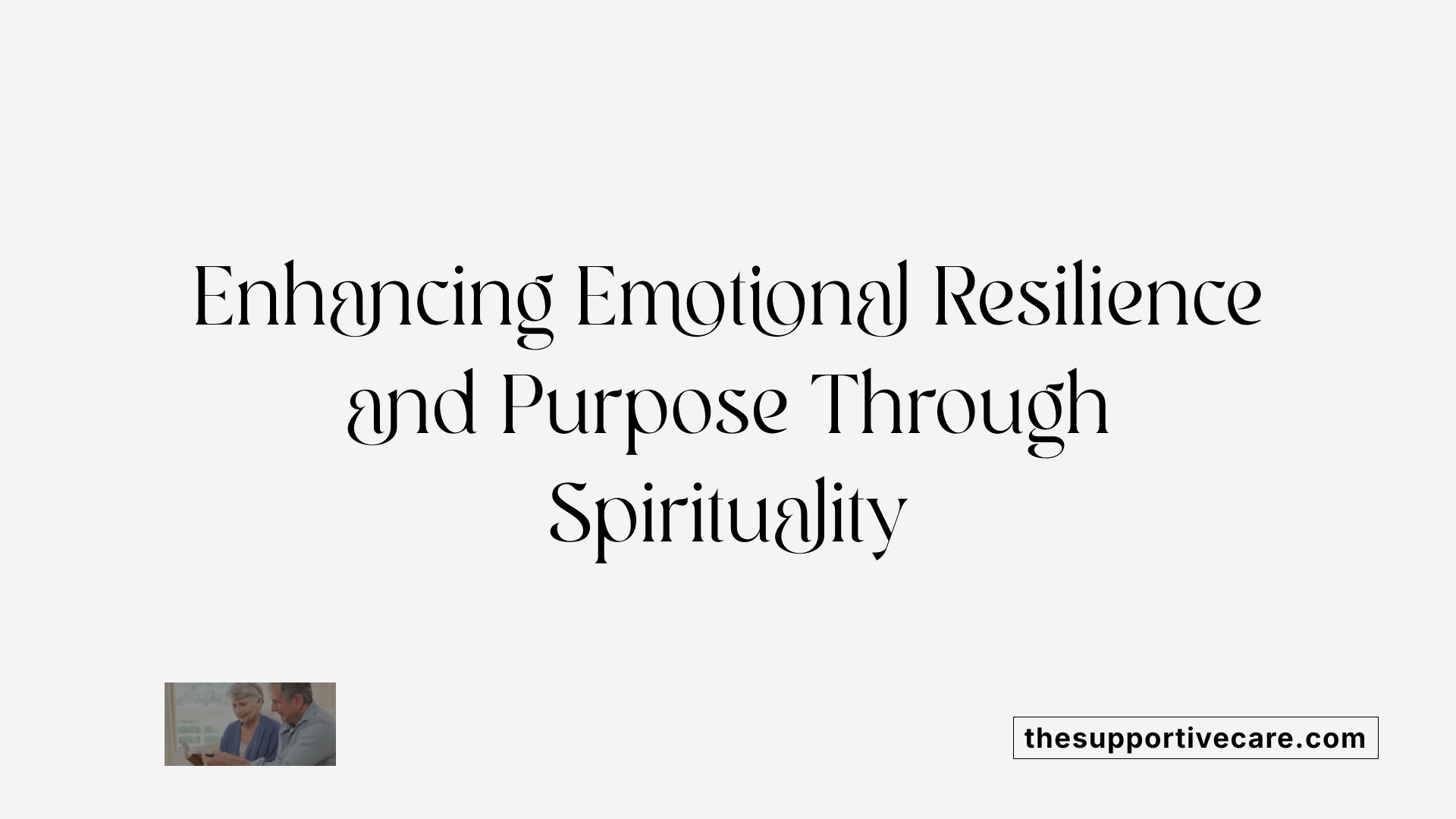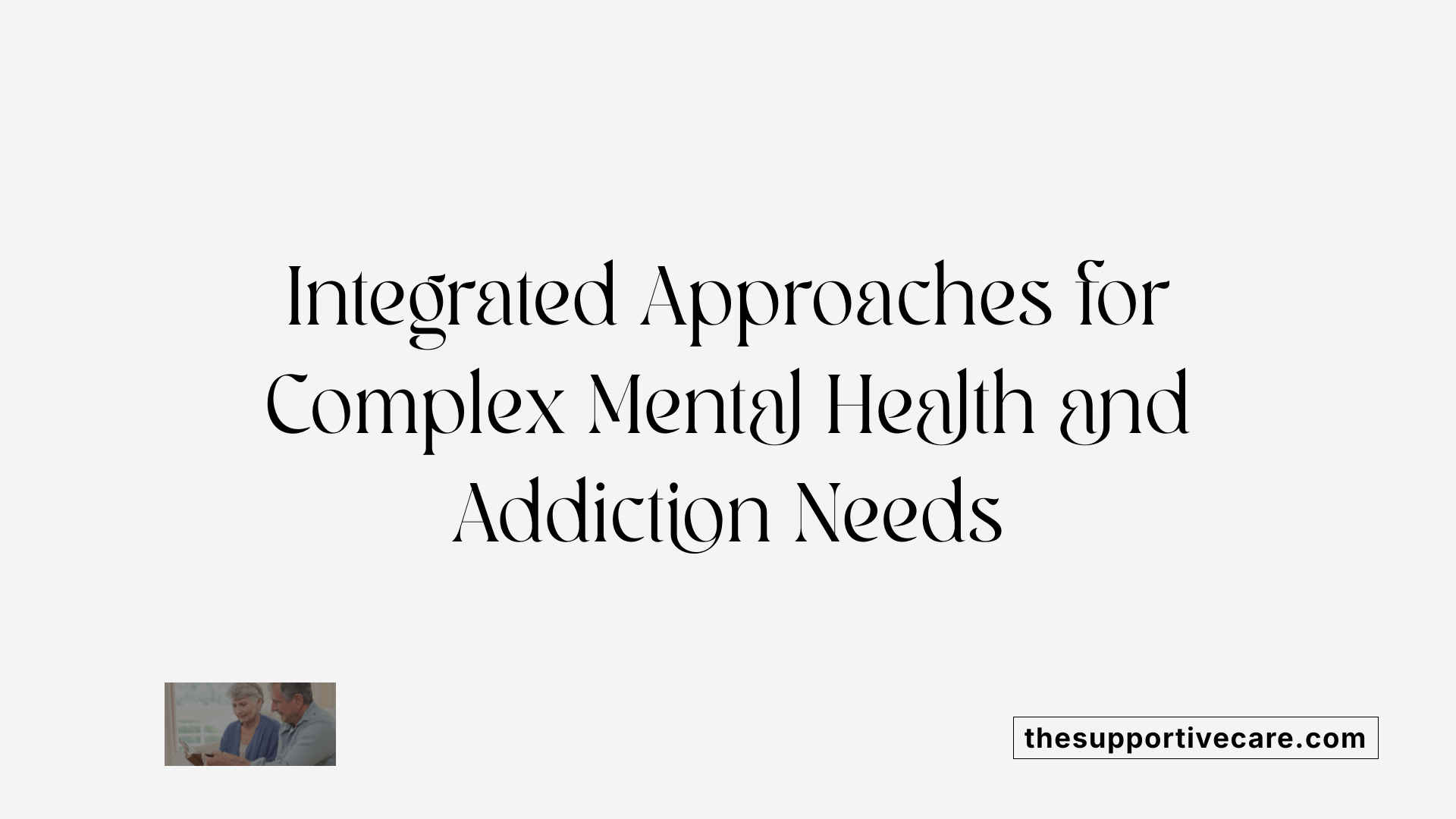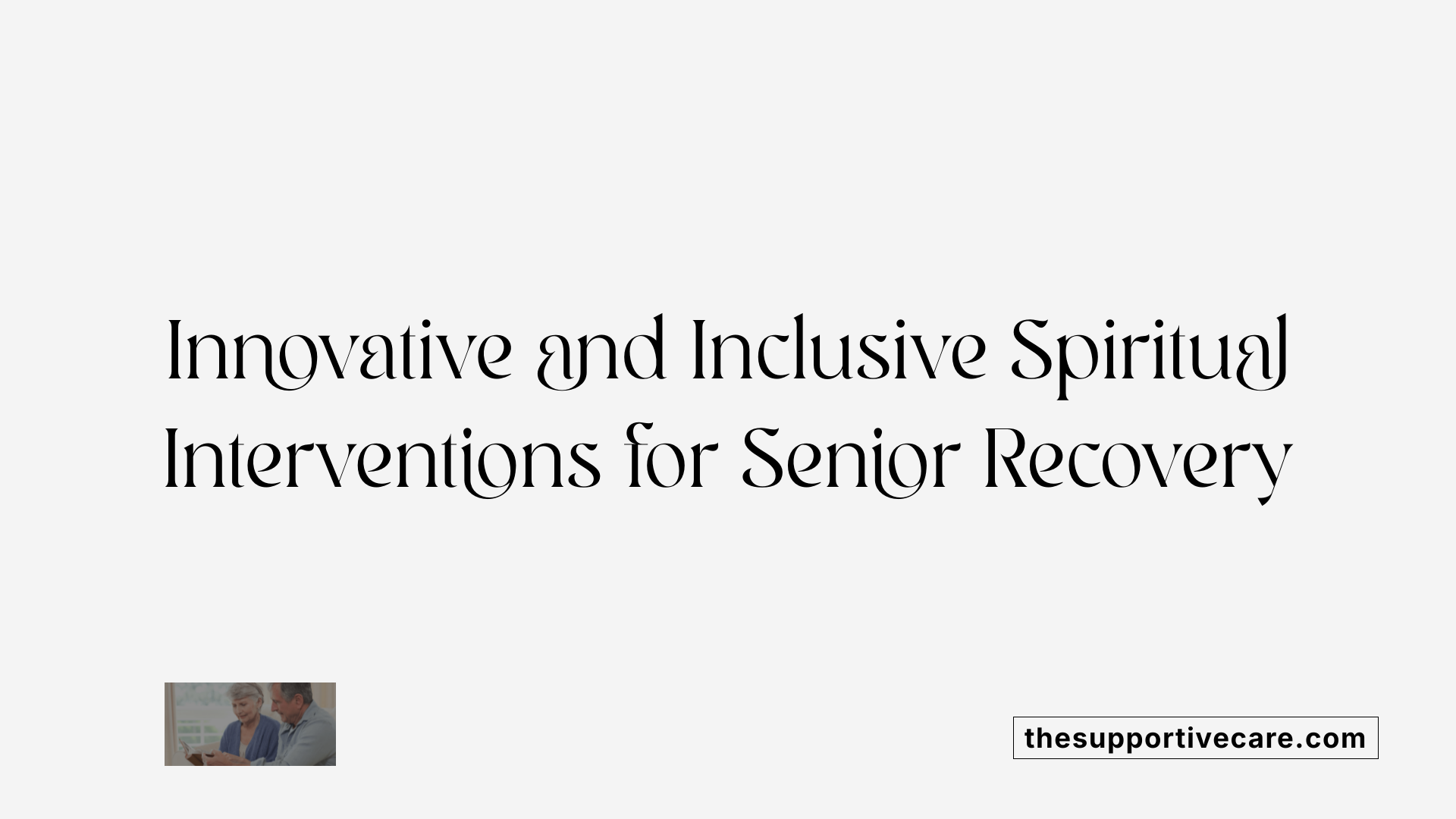The Vital Link Between Spirituality and Behavioral Health in Seniors
The integration of spiritual counseling into behavioral health services offers a promising avenue to improve treatment outcomes for seniors coping with substance abuse, mental health challenges, and addiction. As aging populations face unique recovery obstacles, a holistic approach incorporating spirituality alongside medical and psychological interventions can foster resilience, meaning, and lasting recovery.
Comprehensive Treatment Options for Behavioral Health in Seniors

What are the comprehensive treatment options available for substance abuse, mental health issues, and various forms of addiction?
Comprehensive treatment for seniors with behavioral health challenges involves an integrated approach that combines medical, psychological, and social interventions. This multi-faceted care is essential to address the complex needs of older adults facing substance use and mental health disorders.
Evidence-based therapies such as Cognitive Behavioral Therapy (CBT), Motivational Interviewing (MI), and family-based approaches help individuals develop coping skills, motivation, and support networks to aid in recovery. These therapies are effective in managing co-occurring disorders and encouraging behavioral change.
Medication-Assisted Treatment (MAT) is a critical component, especially for substance use disorders. Medications like methadone, buprenorphine, and naltrexone help reduce cravings and withdrawal symptoms, improving treatment outcomes among older adults.
Supportive services are equally important. Peer support groups provide shared experiences and encouragement, while case management helps coordinate care across providers. Transportation services ensure access to treatment and community resources, reducing barriers common in senior populations.
Personalized care plans tailor interventions to each individual's unique needs, preferences, and cultural background. These plans also emphasize prevention strategies to reduce relapse risk and promote long-term wellness.
By combining these elements, treatment programs can effectively address the physical, emotional, and social aspects of recovery in older adults, improving overall health outcomes and quality of life.
The Role of Spirituality as Recovery Capital in Addiction Treatment

What Is Spiritual Well-Being and How Does It Impact Recovery?
Spiritual well-being refers to a personal commitment to finding meaning beyond oneself, often connecting to a transcendent or existential purpose. This form of well-being has been shown to predict less frequent substance use in recovery phases among Black/African American adults, with significant effects lasting up to 3.5 months posttreatment. It supports recovery by nurturing emotion regulation, providing meaning, and fostering resilience during the crucial early stages of recovery.
How Does Spirituality Relate to Abstinence and Relapse Prevention?
Spirituality is strongly linked to abstinence and reduced relapse risk. Participation in spiritual fellowship programs such as Alcoholics Anonymous (AA) and Narcotics Anonymous (NA) promotes higher abstinence rates. Studies find that those who experience spiritual awakening within these programs report better drinking outcomes. Moreover, spiritual practices enhance intrinsic motivation and long-term sobriety, often outperforming non-spiritual approaches.
In What Ways Does Spirituality Support Resilience and Emotional Regulation?
Spiritual practices like meditation, prayer, and mindfulness build emotional resilience and aid stress management, which are critical in preventing relapse. Research reports a strong correlation between spiritual engagement and increased resilience in those recovering from addiction. By improving decision-making and emotional processing, spiritual engagement alters brain stress regulation patterns conducive to recovery.
How Does Spirituality Compare to 12-Step Program Involvement?
While higher 12-step involvement also predicts fewer substance use consequences up to about 6.6 months posttreatment, spirituality independently promotes positive recovery outcomes beyond these programs. Enhancing spiritual well-being can augment the benefits of 12-step participation by fostering a deeper sense of purpose and meaning.
What Are the Neurobiological Aspects of Spiritual Engagement?
Neuroimaging studies link spiritual experiences to activation in the parietal cortex and engagement of ventral frontotemporal networks. These brain regions are involved in stress reduction and emotional regulation, indicating that spiritual engagement may biologically assist in mitigating addiction risk and improving recovery success. This neural basis supports why spiritual practices effectively strengthen coping mechanisms and resilience.
| Aspect | Description | Impact on Recovery |
|---|---|---|
| Spiritual Well-Being | Personal connection to existential meaning and purpose | Predicts less substance use |
| 12-Step Involvement | Participation in programs like AA/NA emphasizing a Higher Power | Fewer substance use consequences |
| Emotional Regulation | Meditation, prayer, mindfulness improving resilience and stress coping | Reduces relapse risk |
| Neurobiological Correlates | Brain activations associated with spiritual experiences | Supports stress modulation |
| Long-term Sobriety | Combining spirituality and structured programs | Higher abstinence rates |
Spirituality’s Influence on Mental Health Among Seniors

How does spirituality support emotion regulation, meaning, and purpose in older adults?
Spiritual well-being plays a crucial role in helping seniors regulate their emotions and find a meaningful sense of purpose in life. Engaging in spiritual practices fosters emotional resilience and provides a framework through which older adults can interpret life challenges. This sense of meaning and purpose can act as a protective factor, aiding recovery from mental health issues by promoting hope and guiding positive coping strategies.
In what ways do faith and spiritual practices reduce anxiety and stress among seniors?
Faith and spiritual involvement are linked to lower anxiety levels among older adults. Practices such as meditation, prayer, and mindfulness help ease mental distress by strengthening emotional regulation and reducing the physiological effects of stress. These activities encourage calmness and improve overall well-being, which is particularly beneficial for seniors managing mental health conditions or substance use concerns.
How does spiritual development foster altruism and gratitude in the elderly?
Spiritual growth often involves a progression from self-focused concerns to a broader, more altruistic outlook. In older adults, this development encourages the cultivation of gratitude and other positive moral emotions that enhance social bonds and community participation. Gratitude functions as a powerful motivator for prosocial behavior, which further supports mental health and social integration.
What role does spirituality play in mitigating symptoms of mental illness and supporting recovery in older populations?
Spiritual practices provide seniors with coping mechanisms that can counteract the inward focus commonly associated with mental illness. By encouraging connection to a higher purpose or transcendent meaning, spirituality can alleviate symptoms like hopelessness and anxiety. This holistic approach supports individuals in recovery by fostering resilience, emotional healing, and a renewed sense of identity.
Why are spiritual assessments important in clinical practice for holistic mental health care among seniors?
Incorporating spiritual assessments enables healthcare providers to understand patients’ beliefs, worldviews, and coping styles more comprehensively. This understanding allows for the integration of spiritual dimensions into personalized treatment plans, improving engagement and outcomes. For older adults, whose spirituality often shapes their experiences of illness and recovery, these assessments are critical to delivering culturally sensitive and effective care.
Spiritual Counseling Integrated with Evidence-Based Therapies
How are spiritual counseling and evidence-based therapies combined in treatment?
Spiritual counseling is increasingly integrated with evidence-based therapies such as Cognitive Behavioral Therapy (CBT), Medication-Assisted Treatment (MAT), and Motivational Interviewing (MI). This holistic approach addresses not only the psychological and physiological aspects of substance use disorders but also the spiritual and existential needs of individuals.
What spiritual practices are commonly used alongside standard therapies?
Practices like mindfulness meditation, prayer, yoga, and breathwork are incorporated into treatment to support emotional regulation and self-awareness. These spiritual activities complement traditional therapies by providing structured coping mechanisms that mitigate stress and reduce relapse risk.
How does spiritual counseling enhance motivation, resilience, and long-term sobriety?
Spiritual engagement fosters intrinsic motivation and a sense of purpose, which are crucial for sustaining long-term sobriety. Individuals participating in spiritual recovery frameworks report greater resilience to stress and improved emotional processing, aiding their ability to maintain recovery over time.
In what ways can spiritual frameworks address trauma and emotional pain?
Spiritual counseling helps clients work through trauma by encouraging forgiveness, self-reflection, and the development of gratitude. These practices create emotional grounding and promote healing by shifting focus from self-centered pain to altruistic and meaningful life perspectives.
How is spiritual counseling tailored to individual and cultural needs?
Effective spiritual counseling respects diverse beliefs and definitions of spirituality, offering flexible, personalized exploration options. Treatment programs are sensitive to cultural backgrounds to ensure inclusivity, particularly for marginalized groups, enhancing engagement and recovery outcomes.
Faith-Based and Spiritual Recovery Programs: Scope and Effectiveness
Prevalence of Spiritual Elements in Addiction Programs
About 73% of addiction treatment programs in the USA include a spiritual component. This element is most commonly delivered through 12-step programs such as Alcoholics Anonymous (A.A.) and Narcotics Anonymous (N.A.), which emphasize reliance on a Higher Power. This widespread integration highlights the role faith and spirituality play in supporting recovery from substance use disorders.
Diversity of Faith-Based Models
Faith-based recovery programs are diverse, encompassing explicitly evangelical Christian adaptations like Celebrate Recovery, as well as Islamic, Jewish, Buddhist, and Native cultural spiritual models. Secular alternatives, such as SMART Recovery, offer nonreligious spiritual approaches, emphasizing mindfulness and self-awareness. Many treatment facilities blend multiple religious and spiritual traditions, creating personalized and culturally sensitive recovery experiences.
Economic and Social Benefits of Congregation-Based Recovery Groups
Faith-based volunteer support groups hosted by congregations contribute an estimated $316.6 billion annually to the US economy through volunteer efforts and reduced healthcare costs, without taxpayer expense. These programs foster community connection and social resources that are central components of recovery capital, improving mental health outcomes and reducing relapse rates.
Higher Program Completion Rates in Faith-Based Settings
Research shows that faith-based programs report significantly higher completion rates—62.7% compared to 4.7% in non-spiritual programs. The spiritual framework provides motivation, support, and a sense of belonging, which can enhance engagement and sustainability in recovery efforts.
Spiritual Awakening and Improved Outcomes
Participation in spiritual fellowship programs like A.A. and N.A. is linked to spiritual awakening, which correlates with better recovery outcomes and higher rates of abstinence. This awakening fosters emotional regulation, resilience, and a purpose-driven life, factors that are crucial during the early months of posttreatment and long-term sobriety.
These program characteristics suggest that integrating spirituality into addiction recovery offers significant benefits both for individuals and society, through improved health outcomes, economic savings, and enhanced well-being.
The Importance of Cultural Sensitivity and Individual Preferences in Spiritual Care
Respecting diverse spiritual identities and religious affiliations
Spiritual care in addiction recovery must honor the broad spectrum of spiritual identities and religious beliefs. Programs that acknowledge this diversity enable individuals to seek recovery paths aligned with their values, whether rooted in Christianity, Islam, Judaism, Buddhism, native cultural traditions, or nonreligious spiritualities. This inclusive approach enhances engagement by validating personal beliefs and fostering genuine spiritual growth.
Addressing religious struggles that may cause distress
Religious struggles, including conflicts with faith or feelings of spiritual alienation, can exacerbate distress and impede recovery progress. Spiritual care providers need to recognize and address these struggles thoughtfully to prevent increased anxiety or hopelessness. Therapeutic support can help individuals navigate these challenges, promoting healing and reconciliation within their spiritual framework.
Offering options for secular or nonreligious spiritual practices
Not all individuals in recovery identify with religious traditions. Offering secular spiritual practices such as mindfulness, meditation, yoga, breathwork, or connecting with nature provides alternative means to cultivate emotional regulation, resilience, and meaning. These options respect individual autonomy and ensure spiritual care remains accessible to a wider population.
Improving engagement and outcomes with culturally tailored interventions
Tailoring spiritual interventions to cultural contexts significantly improves treatment engagement and outcomes. When programs incorporate culturally relevant practices and language, they resonate more powerfully with participants, fostering deeper commitment and sustained recovery. Personalized approaches that consider cultural background and spiritual identity support meaningful spiritual development and holistic well-being.
Balancing spiritual approaches with professional mental health care
While spiritual frameworks are vital, they work best when integrated with professional mental health services. Structured psychological and medical treatment complements spiritual care, providing measurable outcomes and addressing complex co-occurring disorders. This balanced strategy ensures comprehensive support that respects individual needs while promoting effective, evidence-based recovery.
Spiritual Practices that Foster Emotional Resilience and Social Connection
Practices such as gratitude, forgiveness, compassion, and community service
Spiritual practices including gratitude, forgiveness, compassion, and community service play vital roles in fostering emotional resilience. Gratitude, often described as biblical 'thankfulness,' encourages prosocial behavior and shifts focus outward from oneself, which enhances well-being. Forgiveness and compassion help individuals release emotional burdens and build healthier relationships, while community service strengthens social ties and provides a sense of purpose.
Benefits of journaling, creative expression, and spending time in nature
Activities like journaling and creative expression enable self-reflection and emotional processing. They allow individuals to explore their spiritual journeys and express inner feelings constructively. Spending time in nature cultivates mindfulness and spiritual connection, offering peaceful respite that supports emotional balance and mental clarity.
Building protective layers against relapse and suicidality
Engaging in spiritual practices creates protective layers against relapse and suicidality by boosting emotional regulation and fostering hope. These practices help manage stress and emotional pain, establish coping mechanisms, and promote resilience, especially in early recovery phases.
Enhancing social bonds and sense of hope through spirituality
Spiritual engagement enhances social bonds by connecting individuals to supportive communities and shared beliefs. This social connection fosters hope, provides encouragement, and reduces feelings of isolation, all essential for sustained recovery and well-being.
Traits of spiritually healthy individuals
Spiritually healthy people often exhibit emotional resilience, kindness, mindfulness, flexible belief systems, and effective emotional expression. These traits contribute to better coping with life’s challenges, greater psychological flexibility, and enhanced interpersonal relationships, thereby underpinning lasting emotional health.
Addressing Co-Occurring Disorders Through Integrated Spiritual and Behavioral Health Services

What is the prevalence of co-occurring mental health and substance use disorders among older adults?
Co-occurring mental health and substance use disorders (SUDs) are particularly common in older adults. Approximately 20% of older adults experience mental health issues, while 8-10% face substance use problems. Among older veterans, these rates are even higher, with around 50% experiencing both mental health and substance use disorders simultaneously.
How do integrated care models benefit older adults with co-occurring disorders?
Integrated care models that combine mental health and addiction treatment offer significant advantages. By addressing both issues simultaneously, these models improve overall health outcomes. This holistic approach ensures that medical providers communicate effectively, creating coordinated and personalized treatment plans tailored to the complex behavioral health needs of seniors.
Why is coordinated communication among health providers important?
Coordinated communication among providers allows for seamless care continuity. When mental health specialists, addiction counselors, and primary care physicians collaborate, they can monitor progress comprehensively and adjust interventions as needed. This teamwork reduces fragmented care and enhances treatment adherence and effectiveness.
What supportive services can enhance treatment effectiveness?
Alongside clinical therapies, supportive services such as case management, transportation assistance, and peer support programs play crucial roles. These adjunctive services address barriers often faced by older adults, including mobility challenges and social isolation, thereby improving access and engagement in treatment.
How do integrated spiritual and behavioral health services support seniors?
Incorporating spiritual well-being into integrated care fosters emotional regulation, purpose, and resilience. Spiritual engagement can enhance motivation and coping abilities, which are vital for seniors navigating recovery from co-occurring disorders. Tailoring interventions to respect cultural and individual spiritual beliefs further promotes holistic healing and sustained recovery.
Scientific Evidence Supporting the Neurobiological Impact of Spirituality in Recovery
Neural correlates of spiritual experiences identified by neuroimaging
Neuroimaging studies have revealed specific brain regions that become active during spiritual experiences. Notably, activation occurs in the parietal cortex and ventral frontotemporal networks. These neural correlates help explain the complex cognitive and emotional elements involved in spirituality, shedding light on how individuals process transcendent or existential meanings.
Spiritual engagement modifying brain regions related to stress and emotional processing
Engagement in spiritual practices influences brain areas responsible for emotional regulation and stress response. Research shows that spirituality strengthens these neural pathways, enhancing individuals' ability to manage emotional stimuli and reduce stress. This neural adaptation plays a crucial role in mitigating psychological distress often associated with addiction.
How spirituality helps regulate stress-related triggers for addiction
Spirituality offers protective mechanisms against stress-induced relapse. By modulating neural circuits linked to stress, particularly in individuals exposed to early life trauma or chronic stress, spiritual practices reduce cravings and vulnerability to substance use triggers. Techniques such as meditation and prayer promote calmness and resilience, interrupting the cycle of stress and addictive behaviors.
Positive correlation between spiritual engagement and resilience
Empirical findings indicate a strong positive relationship between spiritual involvement and resilience levels in recovery populations (Pearson’s r = 0.665, p < 0.001). This correlation suggests that spiritual engagement enhances psychological toughness, enabling individuals to better withstand challenges during the recovery process.
Implications for enhancing behavioral health treatment
The neurobiological evidence supporting spirituality's impact suggests that integrating spiritual components into behavioral health treatments can improve outcomes. Incorporating mindfulness, meditation, and contemplative practices offers clients tools to manage stress neurologically and emotionally. Therefore, spirituality complements evidence-based therapies by fostering neuroplasticity that supports recovery and long-term well-being.
Navigating Challenges and Ensuring Holistic Spiritual Integration in Senior Care
What are the criticisms of spiritual recovery models and their challenges in senior care?
Spiritual recovery programs, while valuable, often face criticism for their lack of structured frameworks and clear measurement of outcomes. This can lead to inconsistencies in care delivery and difficulties in assessing effectiveness. Additionally, some seniors may experience alienation if spiritual practices do not align with their personal beliefs or cultural backgrounds.
Why is a balance between spiritual and evidence-based clinical care necessary?
Effective treatment for seniors with substance use or mental health issues requires blending spirituality with proven clinical methods such as Cognitive Behavioral Therapy (CBT) and Medication-Assisted Treatment (MAT). This balance ensures that the holistic needs of the individual are met while maintaining rigorous treatment standards and fostering safety.
How can ongoing evaluation and measurement improve spiritual interventions?
Integrating continuous evaluation protocols and standardized measurement tools helps identify which spiritual practices are most beneficial. This data-driven approach supports tailoring interventions for seniors and enhances accountability and progress tracking within recovery programs.
What is the role of self-reflection, humility, and forgiveness in treatment?
Encouraging self-reflection in seniors helps recognize self-oriented tendencies that may hinder recovery. Cultivating humility and forgiveness promotes emotional healing and supports spiritual growth, which reinforces resilience and aids long-term sobriety.
How do spiritual approaches promote hope, meaning, and positive identity reconstruction?
Spiritual engagement fosters hope and imparts a renewed sense of purpose, especially critical during the vulnerabilities of recovery. It supports reconstructing a positive identity by shifting focus outward, enhancing social connections, and reinforcing emotional resilience.
Overall, addressing these challenges with a sensitive, individualized approach ensures that spiritual integration in senior care enhances well-being without compromising clinical rigor or inclusivity.
Future Directions: Expanding Spiritual Counseling in Senior Behavioral Health

Advancing holistic, individualized treatment frameworks
Future treatment models for senior behavioral health should emphasize holistic and personalized strategies that integrate spirituality alongside medical and psychological therapies. Tailoring spiritual counseling to individual beliefs and cultural backgrounds will enhance engagement and recovery success among diverse senior populations.
Community-based support and purpose-driven recovery planning
Building community-centered spiritual support networks can provide seniors with essential social connections and a sense of belonging, thereby combating isolation. Purpose-driven recovery planning incorporating spiritual practices like mindfulness and gratitude can strengthen emotional regulation and foster long-term resilience.
Incorporating forgiveness and leadership in spiritual growth
Encouraging older adults in recovery to cultivate forgiveness and take leadership roles within spiritual or recovery groups can deepen their spiritual development. These roles promote altruism, meaningful engagement, and help rebuild self-esteem, crucial for sustained behavioral health.
Developing accessible spiritual programs for diverse senior populations
Expanding adaptable spiritual counseling programs that respect a range of spiritual identities—including secular, religious, and culturally specific traditions—ensures inclusivity. Accessibility can be enhanced through home-based interventions, telehealth, and partnerships with faith-based organizations.
Leveraging spirituality to reduce relapse, improve well-being, and foster connection
Spiritual engagement helps create protective layers against relapse by enhancing emotional resilience, hope, and social bonds. Integrating spirituality into senior behavioral health services supports well-being and a meaningful life, ultimately promoting sustained recovery and improved quality of life.
Embracing Spirituality for Enhanced Behavioral Health Outcomes in Seniors
Integrating spiritual counseling into behavioral health treatment offers seniors a multidimensional path toward recovery that values their unique life experiences and beliefs. By combining evidence-based therapies with spiritual practices, healthcare providers can foster resilience, emotional regulation, and a renewed sense of purpose essential for overcoming mental health and substance use challenges. Tailored, culturally sensitive spiritual interventions, aligned with comprehensive care, not only improve recovery outcomes but also enrich seniors' overall well-being and quality of life as they journey toward sustained healing and fulfillment.
References
- The impact of spiritual well-being and social support on ...
- Religious faith and spirituality in substance abuse recovery
- Integrating Spirituality into Therapy
- Integrating Mental Health Support and Addiction Treatment ...
- Belief, Behavior, and Belonging: How Faith is Indispensable in ...
- The Role of Spirituality in Addiction Medicine: A Position ...
- What Is the Connection Between Spirituality and Mental ...
- Spirituality and Mental Health: How They're Connected


































































































